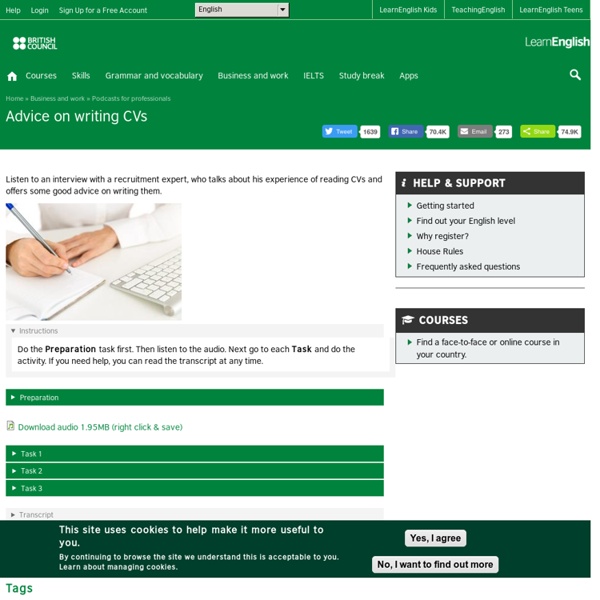Verbs followed by ‘ing’ or by ‘to + infinitive’ 1
When one verb is followed by another, the second verb can either be an infinitive or an –ing form.
Thesis Statements
What is a Thesis Statement? Almost all of us—even if we don’t do it consciously—look early in an essay for a one- or two-sentence condensation of the argument or analysis that is to follow. We refer to that condensation as a thesis statement. Why Should Your Essay Contain a Thesis Statement? to test your ideas by distilling them into a sentence or two to better organize and develop your argument to provide your reader with a “guide” to your argument
learnenglish.britishcouncil
Adam and Rob Both: Hello! Adam: Welcome to episode 11 of LearnEnglish Elementary Podcasts. Rob: You’re going to hear from Tess and Ravi again today. They’re talking about something British that lots of people around the world think is ‘bad’.
Christmas Quiz 2016 – tekhnologic
It’s the beginning of the December. For the past two years, I have produced a Christmas quiz template that can be used for the holiday season. This year is no different. What’s new Last year, I released an updated version of the Christmas tree themed quiz.
Verbs followed by ‘ing’ or by ‘to + infinitive’ 2
Verbs followed by ‘ing’ or by ‘to + infinitive’ (2) When one verb is followed by another, the second verb can either be an infinitive or an –ing form. Some verbs can be followed by either an infinitive, or an –ing form but with a change in meaning. These are some of the most common ones.
Be a better writer in 15 minutes: 4 TED-Ed lessons on grammar and word choice
There’s no denying it — the English language can be mighty tricky. When writing a paper, a novel or even an e-mail, you might look at a sentence you just wrote and think, “Is that comma supposed to be there?” or “Is that really the best word to use?” Fear not! TED-Ed has put together a list of four of our favorite grammar and language lessons to get your next piece of writing in tip-top shape. First, let’s look at the often-confusing comma.
SEQUENCE 1 - Mrs Dubuisson
Wild Wild West A million ways to die in the west Trailer - English
World Cancer Research Fund International
There were an estimated 14.1 million cancer cases around the world in 2012, of these 7.4 million cases were in men and 6.7 million in women. This number is expected to increase to 24 million by 2035. This growing cancer burden, within the overall context of non-communicable diseases (NCDs), was a key focus of the September 2011 UN High Level Meeting on NCDs.
Tone in Writing: Teach Students How to Identify Tone and Use it Effectively in their Own Writing.
written by: Trent Lorcher • edited by: SForsyth • updated: 1/17/2012 It has been my observation that students cannot identify tone, identify whether or not their writing reflects tone, or understand the importance of what they are saying and how they are saying it. Let's take care of that problem right now. After teaching students how to write for an audience and with a purpose, how to effectively evaluate point of view, and how to maintain personal voice, I felt good about myself. I called my dad and told him what a smart son he had. Then I realized my students had no idea how to effectively use tone in writing.
Advice on writing CVs
Interviewer: LearnEnglish Professionals is talking to John Woodrow, who works in the Human Resources department of a large UK-based company. John, tell us about your work ... John Woodrow: I work on recruitment, especially – so I’m the person who reads the hundreds of CVs we get sent each year! Interviewer: Do you accept CVs as part of your recruitment process? John Woodrow: When we advertise for a particular post, we send out our own application form, which is tailored to our company, and we can use it to make sure we find exactly what we’re looking for ...
The Emojis All Londonphiles Have Wanted: Londonmoji
We Londonphiles now finally have a way to express our love for London in the hot new trend of Emoji’s. Londonmoji is the brand new app for iPhone and Android featuring 130+ Londonmojis that let you bring a bit of the capital’s flair to your chat. You can even create your own Londonmoji, with you as the capital attraction, using our London Yourself feature. Londonmoji allows you to bring your love of London to your iMessage and WhatsApp chats in a big, bold way.
5 Examples of Onomatopoeia
Onomatopoeia is a fun, linguistic tool used in literature, songs and advertisements. Now that you've seen examples of the individual words, consider the following examples of onomatopoeia words in use. Take a look at the different onomatopoeia examples in Todd Rundgren's song, appropriately named Onomatopoeia. "Onomatopoeia every time I see yaMy senses tell me hubbaAnd I just can't disagree.I get a feeling in my heart that I can't describe. . .It's sort of whack, whir, wheeze, whineSputter, splat, squirt, scrapeClink, clank, clunk, clatterCrash, bang, beep, buzzRing, rip, roar, retchTwang, toot, tinkle, thudPop, plop, plunk, powSnort, snuck, sniff, smackScreech, splash, squish, squeakJingle, rattle, squeal, boingHonk, hoot, hack, belch."
Quiz: Fixing Most Common Mistakes Seen in Intermediate Written Exams
I must be doing something wrong. On second thought, perhaps my students are doing something wrong. Do you know when your mum tells you off over and over again for not tidying your room and you just nod your head, promise it will never happen again and then, for some unknown reason, you seem unable to keep your promise? My students do it all the time. It’s called being nice.



